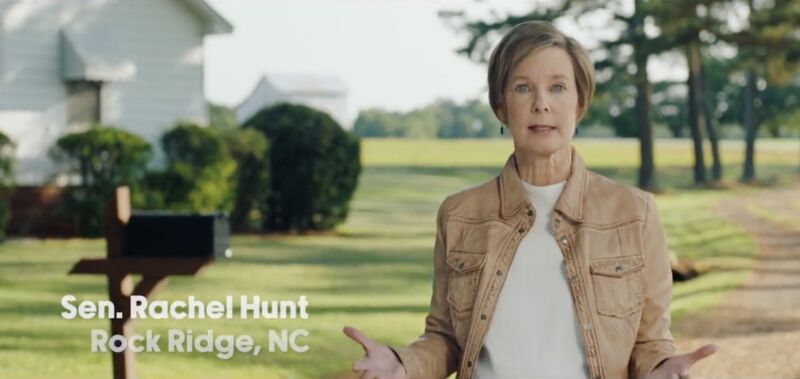“Deeply concerning” —
Twitter ad policy restricting abortion advocacy may soon change, employee says.

Enlarge / A still from a campaign video that North Carolina Senator Rachel Hunt (D) shared on Twitter.
It seems likely that Twitter’s policy restricting advertisers from promoting “abortion advocacy” campaigns could soon be changing.
North Carolina state senator Rachel Hunt (D) told the Huffington Post that Twitter blocked the promotion of a video ad in which she advocated for abortion rights as part of her bid to become the state’s lieutenant governor. Hunt shared emails from Twitter with the Huffington Post that confirmed that her election campaign ad’s reach was restricted because Twitter’s ad policy currently “restricts promotion of health and pharmaceutical products and services,” which includes ads for “abortion clinics” and “abortion advocacy.”
“Ah yes, the mention of abortion advocacy is the issue here,” Twitter’s employee reportedly told Hunt. However, the employee also noted that there may be “some good news to share on that front” in the next week or so.
Twitter isn’t the only platform to restrict this kind of advertising. TikTok has long banned political content and campaign ads. But some interpret the Twitter employee’s email to Hunt to mean that Twitter’s policy on abortion advocacy could soon change. And that would seemingly align Twitter with other platforms like Facebook that permit some ads promoting abortion advocacy, including recent pushes to stop abortion bans, a review of Facebook’s Ad Library shows.
A Meta spokesperson told Ars that Meta allows ads that promote abortion services and discussion and debate about them, but every ad is evaluated to ensure they follow community standards. Ads promoting reproductive health services or products (like abortion pills) can only be targeted to users 18 and older, for example, but ads sharing information about abortion access without mentioning services or products are not subject to restrictions. Misleading ads or ads spreading misinformation are banned.
Meta’s spokesperson said that when it comes to abortion advocacy, those ads fall under its policy for social issue, election, or political ads. That means the ad must adhere to all laws governing political advertising and include a disclaimer noting who paid for the ad.
Hunt’s ad, which is still available on Twitter, confirmed that her political campaign was launched in response to fears over increasingly anti-abortion legislation passed in the state. That includes a state ban on abortion after 12 weeks, which takes effect July 1. Despite restrictions on promotion, Hunt’s Twitter ad has accumulated more than 300,000 views as of this writing, perhaps due to media attention over Twitter’s ad-blocking policy.
I’m running for Lt. Governor because the Republican plan isn’t this year’s 12 week abortion ban; it’s next year’s total abortion ban. I’m North Carolina Senator Rachel Hunt. Let me explain… #ncpol pic.twitter.com/Yb8JFUv0ID
— Rachel Hunt (@HuntforNC) June 12, 2023
The political campaign video starts off by immediately discussing the significance of Roe v. Wade.
“When Roe v. Wade came to rural America, women woke up to a different world,” Hunt said in the video. “A world with a bit more time. Little girls were little girls a little longer. Young women had the freedom to stay or go. The word ‘liberty’ was finally being used to talk about our lives. The important decisions didn’t get easier, but they were hers.”
Hunt then said that it wasn’t the 12-week ban law that concerned her most but any future law that could seek to ban abortion entirely. She said that overturning Roe v. Wade didn’t just change legal precedent but changed the circumstances of “how three generations of women have lived their lives.”
“A move to the city for college, for a career, for life―those dreams didn’t have to end with an unplanned pregnancy,” Hunt said in the ad.
Hunt did not immediately respond to Ars’ request for comment. Twitter does not currently respond to requests for comments, so Ars could not verify if an ad policy change is expected.
Republican post more ads on Twitter
Earlier this year, Twitter “relaxed” its ban on cause-based political advertising, promising to align its advertising policy “with that of TV and other media outlets.” The Federal Communications Commission prohibits the “censorship of candidate-sponsored ads” on radio and TV. Twitter promised to share more on this policy change but never seemed to follow up.
In March, AdWeek reported that Twitter had shared information that “only Republicans” were “running ads on the platform” following the policy change. At that time, ad buyers told AdWeek that “Republican ad buyers allocate nearly 25 percent of their media budget to Twitter, and the range for Democratic advertisers is between 1 percent to 5 percent.”
Historically, Twitter had been mostly useful to political advertisers for fundraising and reaching influencers, AdWeek reported, whereas other platforms are better for direct response advertising.
It’s possible that any change to Twitter’s ad policy related to promotion of abortion advocacy could be motivated by recent reports that Twitter ad sales are currently grim. Twitter may not be able to afford to turn down eager advertisers seeking to boost campaign messaging online.
Twitter’s employee told Hunt’s campaign that “for now,” she “still won’t be able to message” around abortion advocacy. Hunt told the Huffington Post that she disagreed with Twitter’s current policy.
“I find it deeply concerning that Twitter considers the topic of protecting our fundamental freedoms as prohibited content,” Hunt told the Huffington Post. “Regardless, I will continue to focus on sharing my message with voters in every community in every part of the state.”
On Twitter, Hunt made it clear that abortion advocacy countering anti-abortion views that she described as extreme would remain central to her campaign messaging.
“North Carolina’s new abortion bans go into effect on July 1,” Hunt said in the ad. “This campaign will be loud and unapologetic in opposition to extremism.”










